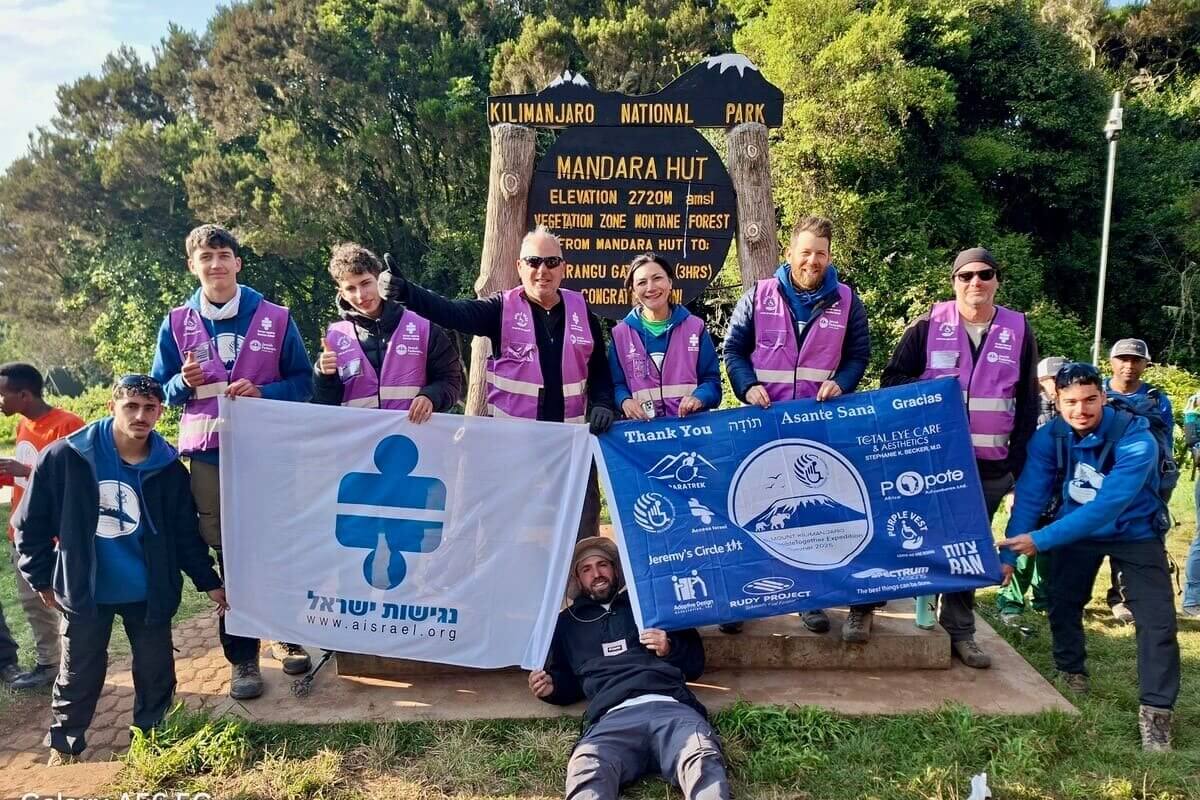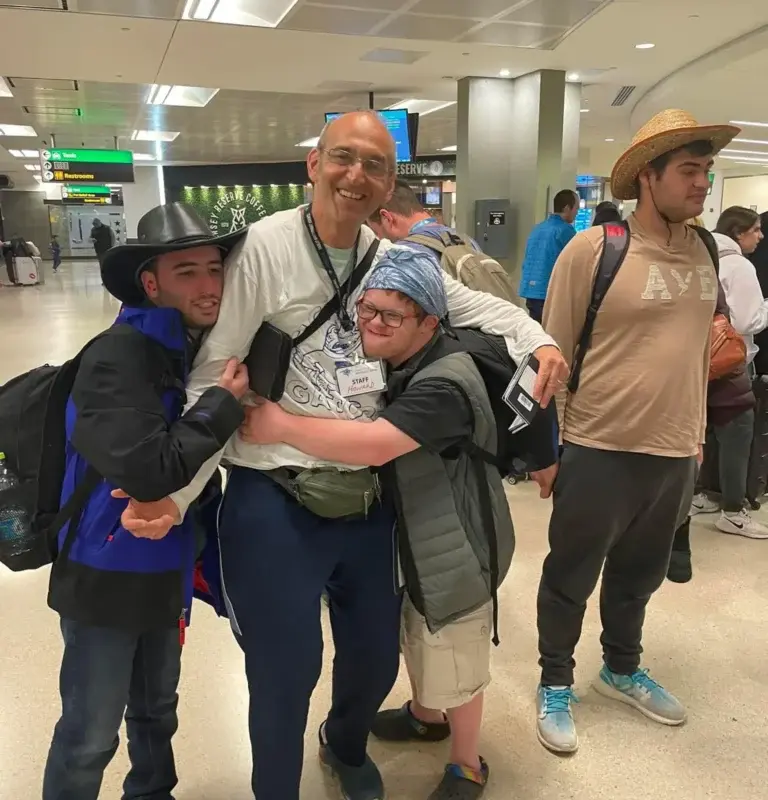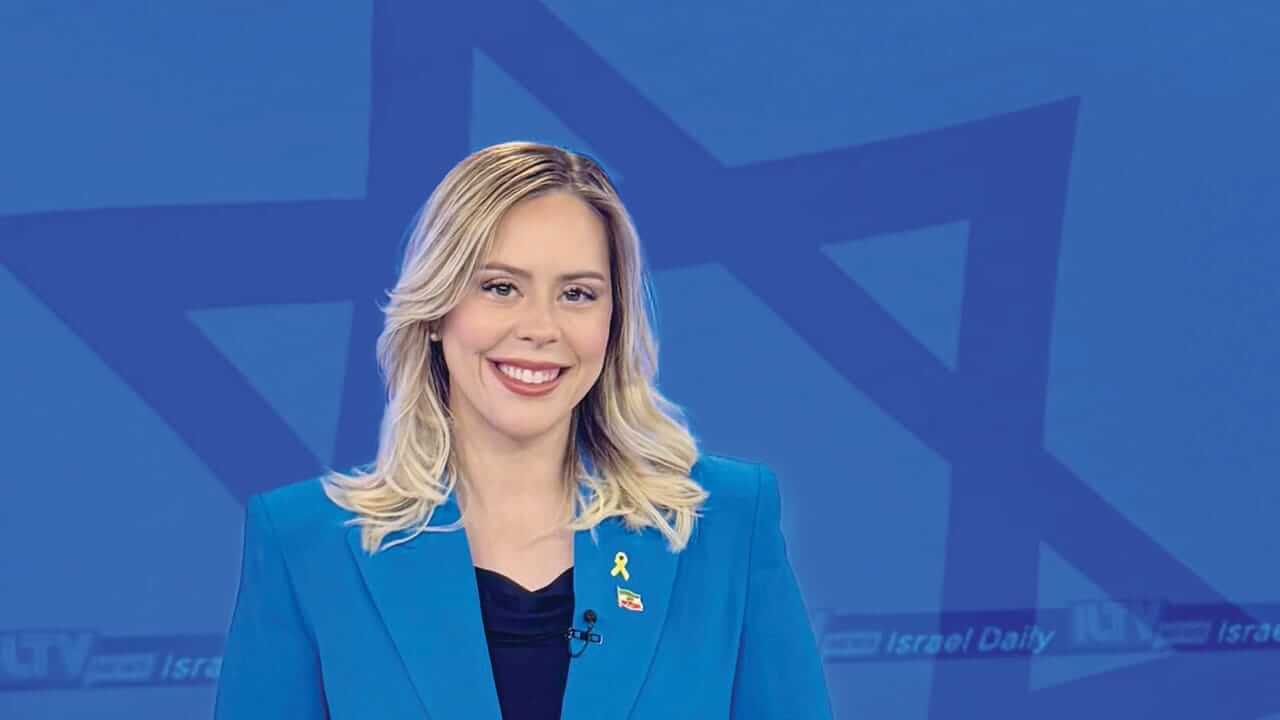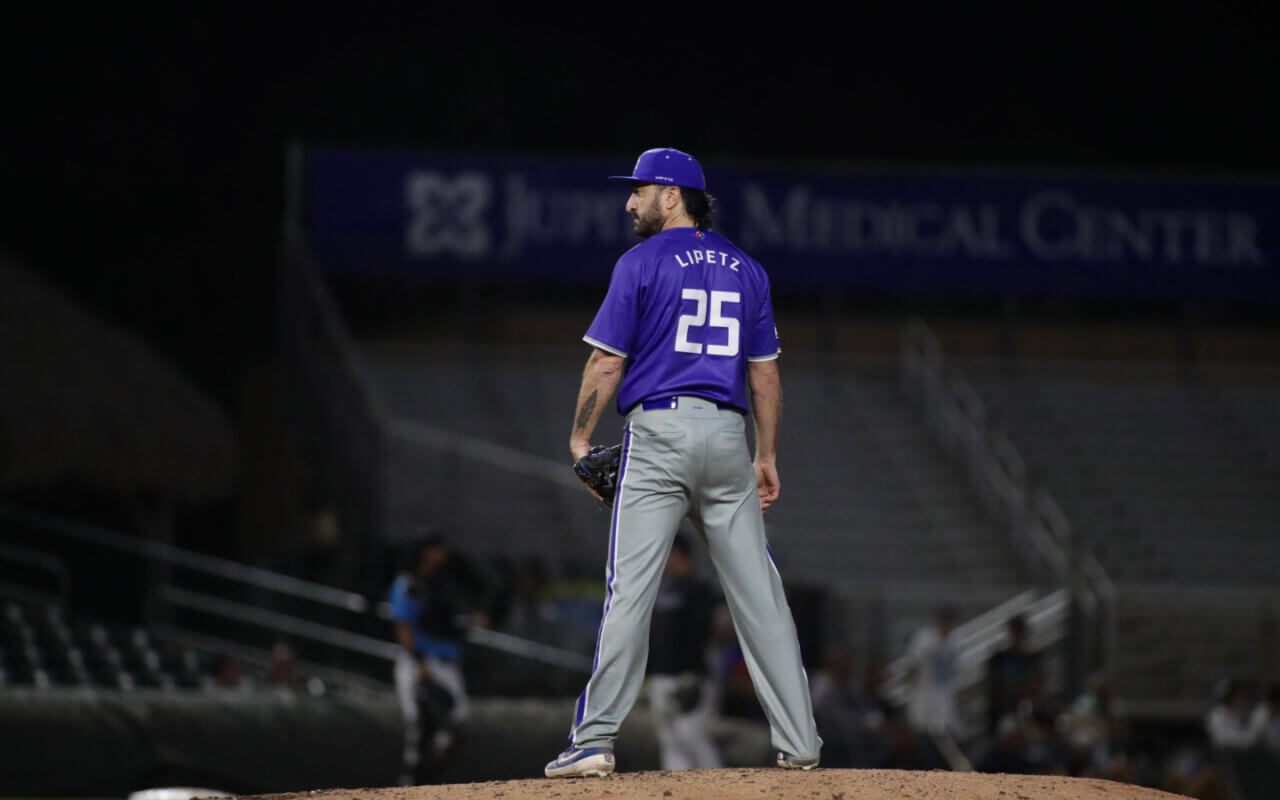A group of hikers, some in purple vests, poses with flags in front of a wooden sign for Mandara Hut in Kilimanjaro National Park. One person is lying on the ground in front, holding a flag.
Airlines, Airports and Autism
Originally appeared in Melange Accessible Journeys Magazine, October 2025
In my experience bringing fifteen groups of people with intellectual and developmental disabilities to Israel on 10-day heritage trips, the biggest challenge has historically been accessing services and accommodations from airlines for people with invisible (hidden) disabilities, and clearing up misperceptions. On one occasion, while boarding a flight with a group of autistic travelers, I was told by the flight attendant, “The pilot wants to speak with you!” He had observed a burly 25-year-old member of my group doing pushups and other exercises in the boarding area and he had concerns the passenger might pose a safety threat. We spoke, he was understanding and the flight proceeded without incident. On other occasions, passengers stared questioningly as our group boarded the flight during the appointed “pre boarding” time. Fortunately, these negative experiences happened more than five years ago. Due to increased awareness and changing laws, it is getting a bit easier for people with invisible disabilities to navigate airports and airlines. But it is still a work in progress.
Our trips to Israel typically depart from one of the New York area international airports. Participants often fly to New York unaccompanied from such cities as Chicago, Los Angeles or Toronto. While they are able to travel independently, navigating a large international airport alone is often challenging as it involves leaving the aircraft, walking to baggage claim and taking the AirTrain or shuttle to international departures to meet the group.
We have tried many systems over the years for helping these group members. On rare occasions, airline customer service has granted permission for a member of our staff to pass through security without a boarding pass to meet the passenger as they leave the plane. On other occasions, we have been in phone contact to help them navigate their way to baggage claim. When we have asked airlines to escort the passenger in the same way they would accompany a passenger with a physical disability (i.e. by pushing them in a wheelchair), they have insisted that the person can only be accompanied IF in a wheelchair. When we explained that the person functions at a high level cognitively and is capable of walking but simply needs assistance to navigate the complexities of the airport, our request for help was denied.
Fortunately, things are changing in terms of services for passengers with a wide range of disabilities. In 2022, seven of the nation’s passenger airlines announced that they are part of a new pledge organized through the industry trade group Airlines for America to increase accessibility in plane travel. In taking the pledge, they committed to a series of new steps to improve travel for people with “mobility, cognitive and social disabilities.” They agreed to work to create a passenger accessibility advisory group to work with the disability community to improve policies and operations and to work to improve passenger transfers and their handling of wheelchairs and other mobility aids. Further, staff training in the area of disabilities would be implemented. The pledge was signed by the CEOs of Alaska Air Group, American Airlines, Delta Air Lines, Hawaiian Airlines, JetBlue Airways and United Airlines Holdings as well as the executive chairman of Southwest Airlines.alt

Airlines like Delta now have extensive “Accessible Travel Services” links on their websites. Delta explains, “Before boarding, in the air, at your destination and anywhere in between, our gate agents and attendants will be available to assist.” They then offer options to click if you need assistance with Nuts or Other Allergies, Wheelchairs and Mobility Devices, Blind or Low Vision or Deaf or Hard of Hearing. For people in need of “cognitive disability assistance,” informs customers, “We are here to help if you or a companion needs navigation or wayfinding assistance throughout your airport experience. Our goal is to provide you with support to make your journey more accessible and enjoyable, including assistance communicating, checking in, boarding, deplaning or connecting to another flight. For assistance, please find one of our Red Coats – our airport customer service experts, identifiable by their bright red coats.” This has proven to be a game changer in recent months as Delta takes helps our participants get to the group meeting area—in another terminal—with their luggage in hand!
On the same link, Delta has a list of airports which offer multi-sensory rooms “to support passengers who need to take a break from the sights and sounds of a busy airport. Some multi-sensory rooms include calming colors, sounds and a small aircraft mock-up to give passengers an opportunity to get familiar with air travel before their flight.” Passengers are instructed to look for one of the airline’s Red Coats for access to the multi-sensory rooms. This service is particularly useful for families of young children with autism.
United also offers useful resources and information on its website for travelers with disabilities. The website notes, “We recommend taking a non-stop flight whenever possible. That way you spend less time at the airport and on the plane. When you’re ready to buy your tickets, you can let us know that you or someone who is traveling with you has a disability. This information lets us prepare to offer help at the airport or during your flight.” It doesn’t specify how, but it offers passengers with disabilities several way to prepare for the trip including reading a social story, and reading an outline of the boarding process . The social story starts, “Today is my travel day. It’s okay if I feel nervous or excited when it’s time to go to the airport. I’ll bring my checked bag, which is bigger and flies in the belly of the plane, and my carry-on bag, which is smaller and will go on the plane with me…”.
United also suggests, “You might also consider practicing for your trip” and notes that “Wings for Autism®actually lets families rehearse the entire flying process. This includes getting a boarding pass, going through security and boarding the plane.” Wings for Autism is a program of Arc, a disability rights organization, geared for both individuals and families and aviation professionals. They report, “The Arc’s Wings for Autism®/Wings for All® (Wings) program gives families and aviation professionals the confidence to take to the skies with ease by providing an airport “rehearsal,” as well as a presentation on the aircraft features and in-flight safety protocols.”
Many airports (325 around the world!) participate in the Hidden Disabilities Sunflower program. Travelers can visit the airport’s accessibility page to find out if they provide free Sunflower lanyards and where to collect them. Their website, explains, “Some disabilities, conditions or chronic illnesses are not immediately obvious to others. For some people, this can make it hard to understand and believe that someone, with a “non-visible” condition genuinely needs support. Some people question whether you have a disability because you don’t look ‘like you have a disability.’alt
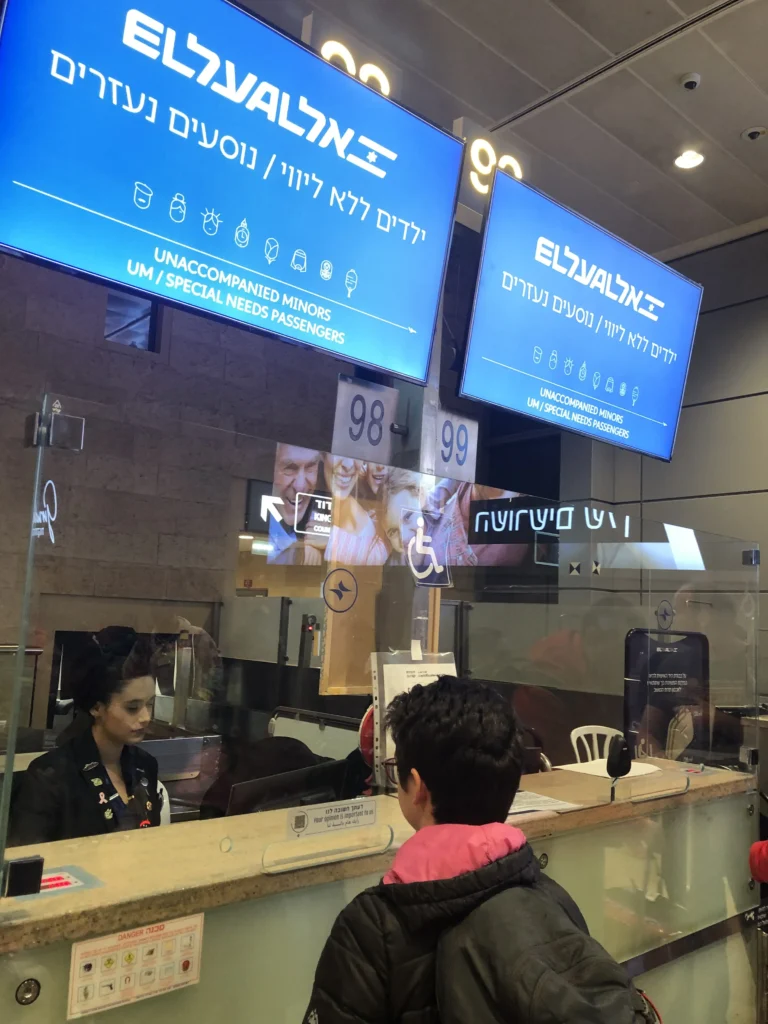
That is why we created the Hidden Disabilities Sunflower – to encourage inclusivity, acceptance and understanding. It is a simple tool for you to share that you have a hidden disability voluntarily. Simply by wearing the Sunflower, you’re just letting everyone know that you might need extra help, understanding, or just more time.”
As an example, in September, 2024, Etihad proudly posted on its website, “Abu Dhabi Airports and Etihad Airways are taking a significant step towards creating a more supportive travel experience with the launch of the Hidden Disabilities Sunflower programme at Zayed International Airport (AUH) and onboard Etihad Airways flights. This initiative underscores both organisations’ commitment to supporting all passengers, particularly those with non-visible disabilities.” We often stop by the booth at the airport to get the lanyards for participants on our Israel trips.
Emirates has taken its commitment to passengers with disabilities to new heights. In January, 2025, they announced that they will become the world’s first Autism Certified Airline, “inviting customers with autism and sensory sensitivities to experience Emirates’ seamless services and personalised hospitality, making travel more accessible for all.”
Their website notes the challenges to travel for those with autism are well documented. “For many members of the global autism community, international air travel is a highly challenging experience, or something to be avoided completely, due to the high level of sensory stimuli that can be involved. A survey on AutismTravel.com revealed that 78% of families are hesitant to travel or visit new locations, and that 94% of respondents would take more vacations if they had access to places where staff are autism-trained and certified. As part of Emirates’ mission to make travel more inclusive and accessible for all, this significant step also supports Dubai’s ambition to become the most accessible destination in the world.”
Toward that end, they surveyed more than 14,000 people with a variety of disabilities, including people with autism, those with sensory sensitivities and their families and caregivers. They developed standards for both passengers and airline staff and conducted several Emirates flight audits on both long and short haul routes. Finally, they helped create new industry standards that accommodate passengers with autism and sensory sensitivities during air travel. The thorough certification process includes ensuring at least 80% of customer-facing staff complete the dedicated training, alongside a commitment to ongoing training and improvements. Thusfar, their “Introduction to Autism and Hidden Disabilities’ training, which was completed by 23,000 staff and they strive to train more than 30,000.
Despite these very positive recent developments at airports and in the airline industry, a recent article in Disability Scoop (June 11, 2025) expresses some concerns, particularly in regard to users of wheelchairs and scooters on flights. They note that the “Wheelchair Rule,” finalized by the Biden administration in December, and requires annual training for airline staff and contractors who help people with disabilities or who handle wheelchairs, will not be implemented as planned. The regulations, which impose stronger standards for how assistance must be provided, specifying that it be “safe and dignified,” and detail the steps airlines must take if a wheelchair is damaged or delayed, is being pushed off until a later date. alt
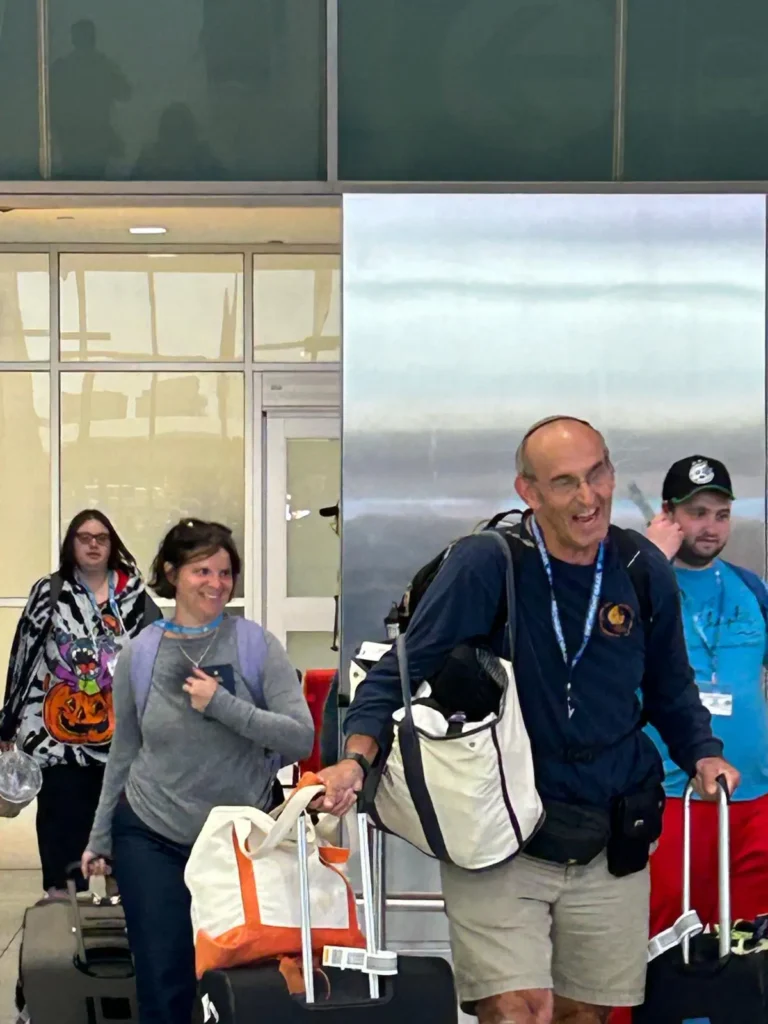
They report, “DOT is now providing notice that it will continue to exercise its enforcement discretion and not enforce the Wheelchair Rule before August 1, 2025, to allow additional time for the officials appointed or designated by the president to review the Wheelchair Rule to ensure that it is consistent with the law, including the requirements of the 2024 FAA Act, and administration policies, and to consider the issues raised by a lawsuit filed recently to challenge certain provisions of the Wheelchair Rule,” the Transportation Department said in a notice about the change.
About 5.5 million Americans use wheelchairs and 1 out of every 100 wheelchairs or scooters on domestic flights is damaged, delayed or lost, according to data provided when the rule was finalized.
We welcome the many promising developments in services and supports for passengers with disabilities and look forward to ongoing improvements.
Jewish activists Emily Schrader, Blake Flayton talk being Jewish on campus – interview
Originally appeared in jpost.com, October 7, 2025
The Jerusalem Post’ sits down with Israel activists Emily Schrader and Blake Flayton, authors of 10 Things Every Jew Should Know Before They Go to College: An Illustrated Guide
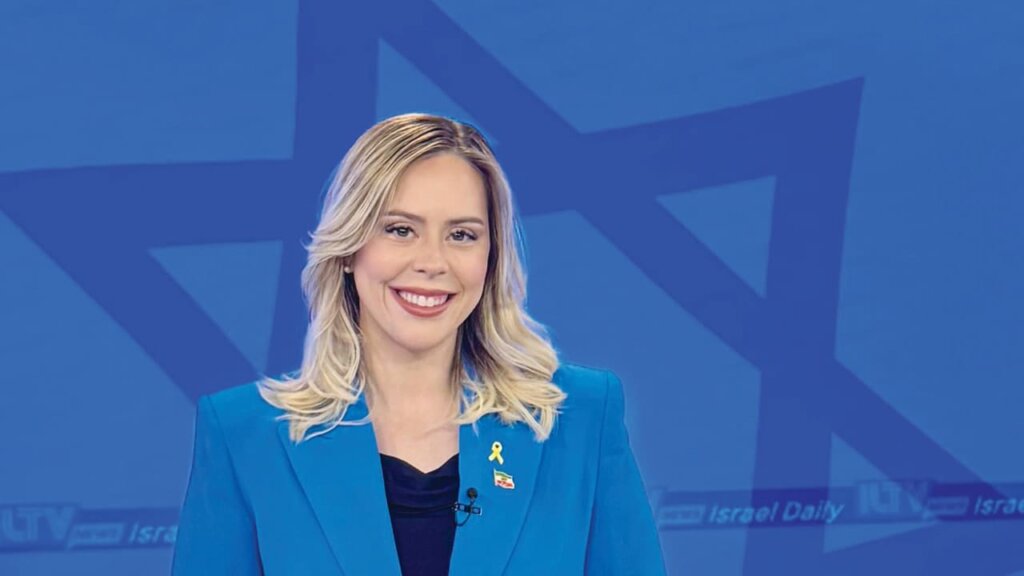
The book 10 Things Every Jew Should Know co-author Emily Schrader explains, grew partly out of her conversations with Kimberly Brooks, the editor and illustrator of the book. They first met at an event in Los Angeles where Schrader was giving a talk.
“The issue of antisemitism on college campuses has continued to grow over the years because the administrations haven’t dealt with it; and at other levels, this problem hasn’t really been dealt with. So that was my main inspiration,” she told The Jerusalem Post
Schrader is an American-Israeli journalist at Ynet and JNS, who freelances with ILTV. She made aliyah 10 years ago. She attended the University of Southern California (USC) and says, “I’ve wanted to write a bit more about the issues facing students since college.” She has been in the Jewish pro-Israel advocacy world since then, beginning with Stand with Us and being involved with several other organizations, such as AIPAC. It was a Birthright trip that ultimately inspired her to make aliyah, impelled by the obsessive anti-Israel movement on campus.
Schrader’s co-author, Blake Flayton, described himself as “a writer and social media editor,” until entering his IDF service. He just completed the first year of his master’s degree at Bar-Ilan University, studying religion and politics. “Once my army stint is finished, I will go back and finish that degree,” he said.
“I went to George Washington University with the intention of becoming a progressive activist, getting involved in all the liberal progressive politics that were happening on campus and in DC at the time. It was the dawn of the Trump administration, so that was really my passion. I wanted to fashion a career out of it.
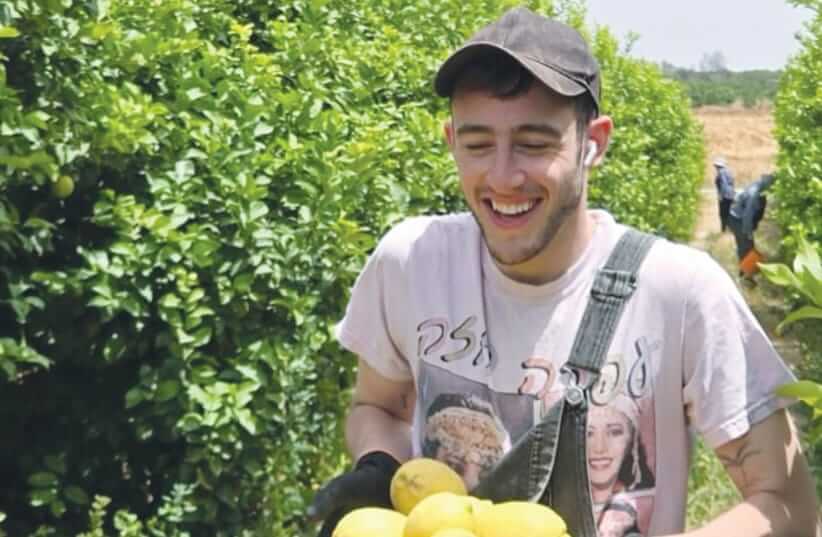
How did you two connect?
Schrader: I knew about Blake Flayton before we ever met and had followed his work. He was at university a few years after me and had quite a bout with antisemitism. He spoke about it very publicly, very bravely, and so I had a lot of respect for him as a professional and I thought he would be an important voice to bring on, to bring a different perspective because this an issue that affects all of the Jewish community and allies. I followed him on social media and saw several articles he had written, including one that got a lot of attention in The New York Times.
Tell us about yourself, Blake.
Flayton: I encountered antisemitism on campus, which at first I perceived as there being something wrong with me, that I had been brainwashed, that I had been led astray by my community into defending Israel, into defending Zionism, and I thought that I needed to unlearn that, take on a different opinion in order to fit in with my peers and teachers and classmates.
It really wasn’t until a number of incidents happened that could not in any way be classified or categorized as criticism of Israel and were just blatantly antisemitic, that I really had this awakening and started to call out this antisemitism on campus, where I saw it, and that led to, from my perspective, a lot of social marginalization and isolation.
Did you lose friends as a result of this awakening?
Flayton: I lost a lot of friends just for merely raising the issue in these progressive spaces.
And that experience turned into an article that I was lucky enough to get published in The New York Times in November 2019, about what I had witnessed as a progressive LGBT Jewish student who objected to labeling Israel as a white supremacist Nazi country and refused to do so.
That led me to continue writing about antisemitism in left-wing spaces, especially on the college campus. Two years later, I moved to Israel after graduating from college. I made aliyah, which is crazy because I had never been to Israel, and I wouldn’t call myself a Zionist. Judaism was important, but not that important; it never had a front seat in my life.
Did your college experience influence your decision to make aliyah?
I moved to Israel for a lot of reasons, and what I experienced on the college campus was definitely a big part of it. After October 7, there were days when I wondered what to do with myself. I needed a project in which to immerse myself, and that’s when Kimberly, the publisher and illustrator, got in touch with us and said, ‘Emily recommended your name for this book.’ They had written the outline for it, and then October 7 had put it in hyperdrive, like ‘We need this book now’ sort of thing, and I said, ‘Yes!’
We started working on it prior to October 7. It was not a new phenomenon. It’s just that the way things changed and the speed at which it changed after October 7 was very dramatic and very drastic, in particular for students on campus. So we knew pretty quickly after October 7 that we were going to have to push to move this forward a little bit more and also adjust based on the trends that we were seeing.
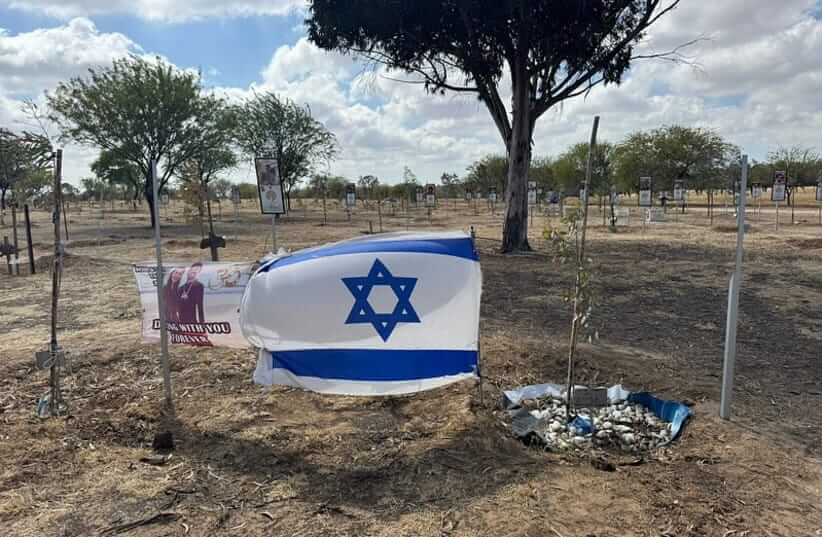
How did you react to October 7?
Flayton: When October 7 happened, there was a 12-hour window after the world became aware of the Hamas atrocities, when I and fellow Israelis and Jews and allies involved in this space began talking about antisemitism. I thought, ‘Okay, now it is going to change.’
And that was really important because it showed me – and Emily as well – that this isn’t about Israeli policy and this isn’t about the Israeli government and this isn’t about the politics and the reality on the ground in the Middle East.
What would you say it is about?
This is a deep-seated hatred of Zionism and a deep-seated hatred of Jewish self-determination. And we saw that because after October 7, hatred got louder. When some of us naively assumed that it would get softer or at least become more reasonable.

Is ‘10 Things’ just a book for students on college campuses?
Schrader: A lot of parents in the Jewish community and students have contacted me and are reading it or finding it very useful. There are some Jewish private school educators, particularly in Los Angeles, who have incorporated it into their curriculum. We wanted people to be able to understand at a basic level, with as little political bias as possible, to understand what people are talking about when they speak about Israel.
Usually, they don’t know themselves, so we want to make sure that everyone – especially students going to university – knows what they are talking about, at least at the basic level.
Then they can go into further research to decide where they stand on various issues themselves. But it’s important to have a general overview when people are going to talk to you as if they know things about this conflict, when often they have no clue.
What kind of feedback have you received?
Flayton: I have been in touch with many people – young and not young, Jewish and not Jewish – who have read the book. And even people who know quite a great deal about Israel and Israeli history and Jewish history have come up to me and said there are at least a few things in the book that they didn’t know and that were surprising and gratifying. The book really is for everybody: for Jews and non-Jews, people in college or starting college, and those who haven’t been in college in 40 or 50 years.
Schrader: The feedback I’ve gotten has been very, very positive, interestingly from Right to Left. I have people who are very much pro-settlements who really liked the book and appreciated the information that was brought forward; and I had people who are on the Left who said, ‘This was a very fair analysis of what’s going on in Israel.’
How did you manage that?
Schrader: That was intentional. That was our goal. Not to make it partisan one way or another, but about what one side thinks and what the other side thinks and why they might think that way.
Why is what happens on university campuses so important?
Flayton: We wanted to highlight how important the campus environment is because the people who are on campus are our future. They will be the ones who will be bringing these ideas into the mainstream, which, of course, regarding the anti-Israel movement, we have absolutely seen: people who marinate in anti-Israel and anti-Jewish ideology and ideas, and then go on to change the way politics and media, and even the law, work. And certainly pop culture. We are dealing with all of this right now, when the campus is sort of ground zero for that.
What is the main purpose of your book?
Schrader: Our purpose was to provide a resource for people; not a history book they have to read cover to cover that will take them half a year to get through. Something where people can flip to a page about a certain topic and understand the context of what’s actually being discussed – whether it’s in a classroom, or in your dorm with your friends, or with your parents at dinner. All of these topics have well-sourced information about these issues that can help people to answer questions and think critically.
Flayton: In this political environment, you hear jargon about the conflict like ‘occupation,’ ‘apartheid,’ ‘UNWRA,’ ‘genocide’ – the list can go on and on. You hear the ‘Palestinian Authority,’ you hear what’s going on in other Middle Eastern countries, which is, of course, a huge part of the book as well.
This book serves as a resource for anyone who wants to know more about any of those and related subjects. People can open the book, find the term in the index, and get to read a paragraph or two about it.
And that is desperately needed, not only in the young Jewish world but also for the wider community of young people – and people in general.
Do you think that things are beginning to improve on campuses?
Flayton: I think that some people have woken up and chosen sides and realized how crazy this whole movement is, and some people have gone the opposite way. It’s hard to tell right now because the dust hasn’t settled in regard to who really stands where.
I will say that, based on what I have seen and read and what I have experienced myself on campuses since October 7, when I have gone to speak, I don’t think what is happening on campuses represents what people really think. Right now, the majority of Americans support the State of Israel in some capacity. The majority of Jews do identify with Zionism, even if they have questions and even if they don’t happen to love the current government. And so, I think that what is represented on campus, as if Israel is this awful pariah state that everyone hates, is just not true.
And that was another reason that it was very important that our book be geared toward young Jews and college students because they need to understand that what they are hearing and seeing is not necessarily reality. What people are saying in the environment they are currently in on a campus is not the real world.
However, antisemitism is a rising problem. And what happens on campus has the potential to be the reality in the mainstream of society very soon. And so that is part of the reason we have to work with these communities and educate them to speak about these issues and write about them in books like this.
What can you say about the double standard for Jews and other groups?
Flayton: I am very sympathetic to the argument that the campus should be an absolutely free speech zone. And other students will need to deal with it; and if they are very offended by it, then they should come armed with their own arguments, and there should be a free marketplace of ideas. I think in a lot of ways that is the point of a campus, of the college experience, to get kids out of their comfort zone and allow them to experience how others see the world.
What upset me so much in college was the blatant double standard that our universities have been applying to the Jews. If a community on campus, a minority community, feels aggrieved by something, whether it be the Black community, the LGBT community, the disabled community, or the immigrant community, you name it, at GW, when there was a scandal involving these communities, the university would trip over itself to condemn the incident. It would reach out to students who were affected by it, to litigate what had happened, and make sure that all of the student body knew that they were on top of it and that free speech did not mean freedom to offend.
But when Jewish students feel offended, or aggrieved, or unsafe, as we saw in the encampment crisis, suddenly the university takes a rather conservative approach to the issue and says, ‘Well, this is just free speech’ as we saw in the hearings when those presidents were testifying: ‘You know, students can say whatever they want; unfortunately, strong political positions don’t go against our code of conduct.’
So, for example, when I published that piece in the Times in November 2019, you probably still could have convinced me that I was wrong. That I had overblown this issue, that I was being dramatic, that antisemitism really wasn’t that big of an issue on the Left but rather on the Right, and that this was simply criticism of Israel, that maybe I was too sheltered and too brainwashed by my community.
How did the university react to your piece in ‘The New York Times’?
Flayton: I accused George Washington University of having a problem with antisemitism – in the best newspaper in the world – and not a single professor reached out to me to have a conversation. There were no diversity, equity, and inclusion workshops. The only thing I experienced, in stark contrast to when other minorities and communities feel aggrieved, was social isolation, antagonism, and the overwhelming feeling that I was not wanted on the campus; that I was an enemy of the spaces I had once been part of.
I think that when you explain to young people how the double standard on campus works, the veil is lifted about this having anything to do with Israeli policy. It is about Jewish students, and Jews in general, being treated differently. We’ve seen that turn already in pop culture, media. politics, and social media. It is a huge part of that as well.
The past five to 10 years of American public life have been a reflection of what the educated elites have been propagating, at least when it comes to the Middle East.
What is your advice to college students?
Flayton: Jews have two options. They can choose to go to those universities that have been in the news, that have a problem, ready to fight, ready to stand up for the Jewish people, stand up for Israel. And, of course, this book is a great piece of ammunition to have in this fight. It is perfect for it. That’s why we wrote it.
Or they can choose to go to college in Israel, which is a huge recommendation in our book, by the way. Those who are able to should make aliyah. Because we are Zionists, and ultimately that is what Zionism means. These campuses don’t really deserve you anymore. And if the Jewish people no longer feel welcome or celebrated at these universities, then what is going to happen to them is what happens to every environment that no longer welcomes or accepts its Jews. It cannibalizes itself and falls from grace.
Beyond the Mullet: The Shlomo Lipetz Story
Originally appeared in israelbaseball.org, September 21, 2025
Is Shlomo Lipetz a baseball player who is passionate about live music, or is he a music industry professional who, at age 46, still manages to pitch two or three times a week? The answer is obvious: he’s both.
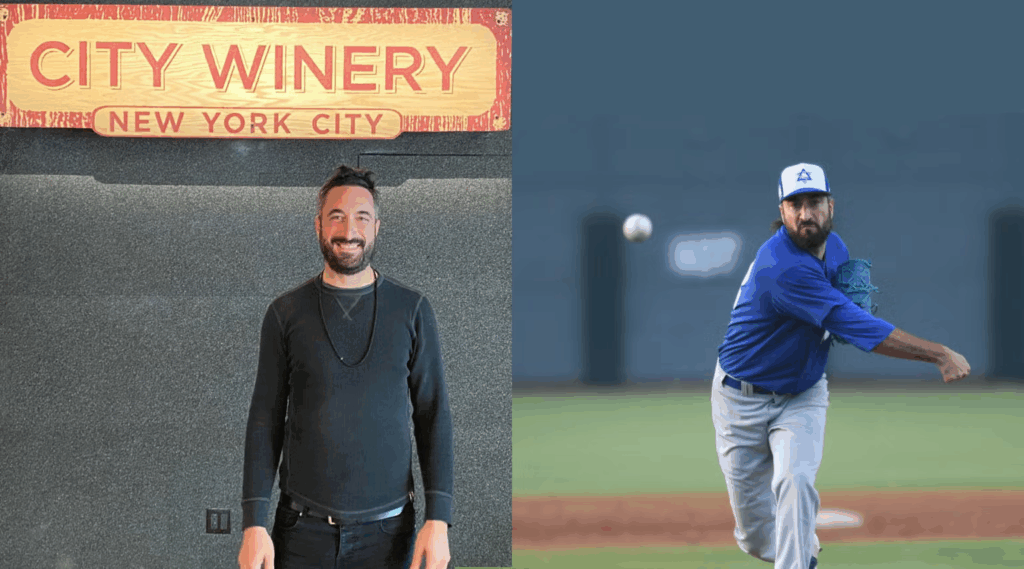
“I am lucky to indulge in two things I love,” Lipetz said over the phone while driving to Wantagh, Long Island (New York) from his “real job” as president of venues at City Winery, the famous music venue with seven locations across the United States. He was going, of course, to play baseball.
In the course of the conversation, Lipetz seamlessly moves from discussing playing baseball as a boy in Israel, to booking Prince and other famous musicians, his love for cats, being a foodie, and of course his playing career with Team Israel.
For fans of Israel baseball, Shlomo Lipetz is a legend, with a storied career that includes being with the team at every point in its history. He has earned the right to have his own bobblehead doll—and even a Shlo Motion t-shirt. Available for purchase!

It is hard to describe Lipetz in a few words, but in a 2023 Fox Sports piece, Jake Mintz took a stab at it.
“Armed with a mid-70s fastball, a vagabond’s passport, a mullet and, sometimes, a gold tooth,” said Mintz, who made his name as part of “Cespedes BBQ” online. “Lipetz is Kenny Powers, Forrest Gump, Paul Bunyan, Batman and Walter Johnson rolled into one.”
Not bad, but Lipetz so much more than even that. Born and raised in Tel Aviv, he got hooked on baseball at an early age and has never stopped living, breathing and playing the game.
He watched for a while, then starting playing catch with a softball under a bridge in Tel Aviv’s Yarkon Park. He started playing but regularly stayed on after hourlong practices for an additional 90 minutes of popups and grounders. He couldn’t get enough.
Lipetz isn’t sure how the game grabbed him. “All I know is there was something very cool about it.”
His two young coaches, Jerry Glantz and Shai Weiss [and later, such coaches as Leon Klarfeld and Sam Pelter] had something to do with it.
“They were willing to spend personal time,” recalls Lipetz.
And they had more time for each kid. In other sports like soccer or baseball, the coach to player ratio was about 1 to 25, but in baseball, it was 2 to 10. He enjoyed both the personal attention and the competitive nature of the game. Since those early days in Yarkon Park, baseball has taught Lipetz many life lessons.
“If you look back on life, the subject (you are studying) doesn’t matter, but the teacher does,” said Lipetz. “I could have just as easily gotten hooked on something else but I was athletic and liked being competitive. I could have been in another sport but I had a good arm and ended up with baseball.”
His playing career began as a third baseman who earned the nickname “Shotgun Shlomo.” When his team was short pitchers, he took the mound.
“I liked being the center of attention,” said Lipetz, whose ability to throw strikes consistently helped advance his pitching career – a post-army growth spurt didn’t hurt either. Lipetz didn’t throw especially hard, but he was a pitcher, not a thrower, which contributed greatly to his longevity.
Over the decades, Lipetz has had some great moments on the field. He pitched on the first Israeli team to qualify for the World Baseball Classic, in 2013, and on the 2017 WBC team that advanced to play in Tokyo. He took the mound at the Africa/Europe 2020 Olympic Qualification tournament in Italy in September 2019, which Israel won to qualify to play baseball at the 2020 Summer Olympics, then pitched at those games in Tokyo, delayed by the COVID pandemic to the summer of 2021.
“The Olympics was one of the most mind-blowing experiences of my adult life,” said Lipetz, who stayed on with Team Israel to pitch in the 2023 WBC.
There were also challenging moments and decision points, many of which he turned into learning opportunities.

At the 1989 European Little League Championships at Ramstein Air Base in Germany, Lipetz and his Team Israel were blown out, 50-0 (not a typo), by Saudi Arabia. The legend-to-be took it in stride.
“Nothing could break our spirit,” said Lipetz, who was just 10 years old at the time. “It was such a cultural experience, interacting with the different players and teams, exchanging pins. Playing against such high-level baseball players was all extremely powerful and exciting.
“I’m not sure my ego was fully developed to get scarred (by the huge loss).”
Even though the Saudi Arabian and Jordanian teams were populated by Americans whose parents worked in those countries, government representatives instructed the kids not to shake hands with the Israelis after their games and not to keep the pins they exchanged.
“They grew up playing baseball,” said Larry Bleicher, the coach of that Israeli entry. “Our kids never played a game in their life! They were learning the rules as we went along.”
The score was 13-0 after the first inning and the umpires recommended implementing the mercy rule.
“They wanted to call the game after nine minutes,” said Bleicher. “We huddled as a team and reminded the guys we didn’t come to win but to improve from the experience and to learn what the game is about.”
Bleicher’s boys played out the game for 7 innings and had a great time.
Later in the tournament, they lost 12-1 to Ramstein, representing Germany. Scoring that first-ever run was a huge highlight for Lipetz.
“We were so excited that after the game we grabbed the Israeli flag from the dugout and the whole team ran around the field,” Lipetz said.
From that point on, Lipetz wanted to play college baseball. He may have been the only boy at the time in Israel with that dream.
“At age 16, I thought about skipping the army to play college baseball,” said Lipetz. “But as time passed, I didn’t have the guts.”
Before setting off on a three-month pre-army trip, Lipetz applied both for an elite naval unit and to be a sportai mitztayen (outstanding athlete), where he would be able pursue a career in baseball while completing his army service.
He was in the United States when his father called to say he had been accepted to both.
“It was the easiest decision,” said Lipetz, “and it changed my trajectory.”
With elite athlete status, Lipetz could train, attend baseball clinics, and go to tournaments in the Czech Republic and the Netherlands—all while completing his army service.
After the army, it was time to pursue Lipetz’s true dream—playing college baseball. This was no easy task for an Israeli kid who grew up in a country without serious competitive baseball or even regulation baseball fields.
Lipetz walked onto the field at San Diego Mesa (Junior) College and said: “I am Shlomo. You don’t know me. I want to play baseball.”
The coach offered an opportunity to throw in the bullpen and Lipetz made the team. He hit the gym – hard – and over the course of his time there, and eventually at the University of California-San Diego, his fastball jumped from 75 miles per hour to 89.
In his first year after transferring to UCSD, Lipetz went 5-0 and led the team with a 2.84 ERA, sharing the club lead with three saves. The next season, he had a team-leading seven saves. While Lipetz is proud of his Team Israel accomplishments, he describes with almost equal delight how UCSD has climbed from NCAA Division 3 to become a powerhouse, in his words, in D1.
After spending some time playing semi-pro ball in Mexico, Lipetz was invited to participate in the just-formed IBL, a professional baseball league in Israel in 2007. One of the few players with high-level baseball experience, Lipetz excelled, posting a 0.98 ERA in 27⅔ innings.
A few months later, Lipetz moved to New York and answered an ad on Craig’s List for an unpaid internship with famed entertainment industry executive Michael Dorf. The next year, the venture Dorf was working on became known as City Winery, and Lipetz followed him there.
Lipetz has been with Dorf and City Winery ever since, rising steadily through the ranks to his current role as president of venues.
“I listen to music from the minute I wake up ‘til I go to sleep.”
While Lipetz played some piano as a kid, he does not currently play an instrument, though the recorder may be in his future. His father picked it up at 80, after all.
Lipetz has worked closely with nearly every big name in music and still remembers his first big show, a Philip Glass residency. Lipetz also remembers booking Prince.
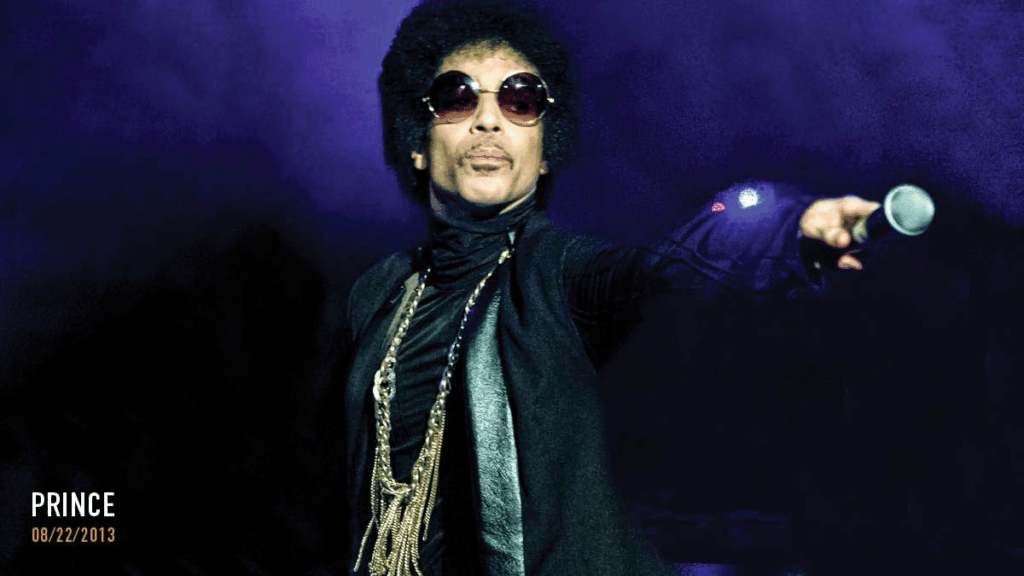
“One night, (Prince) did not go on stage until three am,” Lipetz said. “People were peeking in the window to watch him at eight in the morning on the way to work.”
He has worked with Neil Young and Paul Simon and has produced many of the yearly “Michael Dorf Presents” shows including last year’s Patty Smith 50th anniversary show. He is currently hard at work on next year’s Billy Joel show.
“I got to work with every artist. I have an excuse to work with the people I love.”
That attitude very much applies to his ongoing work with Israel baseball, where he surrounds himself with those very people. While the team is well aware of his love of baseball, cats (he had three for years, though two recently died) and of his role as a foodie (“I am the chief food officer when we travel as a team”), he proudly reports that he has not forced his musical tastes on his teammates.
Even while immersed in his work at City Winery, Lipetz feels close to and keeps up with developments at all levels of Israel baseball. He followed the Under-23 National Team which recently competed in August’s European Championship in Czechia. They finished last place, but Lipetz saw a silver lining in that most of the players on that team were Israeli-born.
Lipetz also remains excited about the Senior National Team competing at the European Championships in Rotterdam later this month in a group with Great Britain, the Netherlands, and France.
As he contemplates retirement, Lipetz has been thinking about his days with Team Israel and the many players and members of the organization he has encountered over the years.
He appreciates his Jewish American teammates like Ryan Lavarnway and Danny Valencia and what he called their “urge to feel connected to something bigger.” He is pleased by how much playing for Israel has meant to them, even becoming, as he says, “an inseparable part of their identity.” Lipetz has also learned a lot about American Jewry through his relationship with these teammates.
There have been conversations about moving into a coaching role, but regardless of any future formal role with the team, Lipetz will always be around, dedicated to preaching the gospel of Israel Baseball with young players.
Because of course.
The man known simply as “Shlo” has always been a team player. In 2011, he pitched a complete game in the first game of a doubleheader against Great Britain. The team needed one more win to qualify for the European Championships, so he pitched the second game as well.
Despite rumors that the upcoming European Championship in Rotterdam many be Lipetz’s last time competing with the national team, the determined, hard-working, feisty pitcher is not so sure.
“If it was up to me, and as long as I feel I can compete at a high level, I would like to continue to play. I am still very good. I wish someone would take my spot. Let someone beat me out of the position.”
